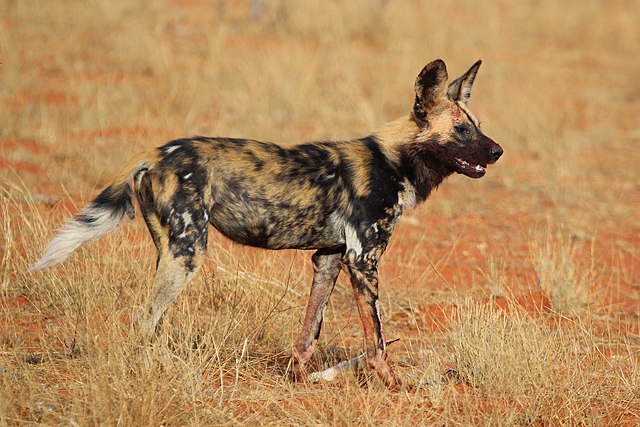African wild dogs are not the same as wolves. The African wild dog and wolf are two completely different species of canines, both with unique characteristics and behaviors. The African wild dog, also known as the painted dog or cape-hunting dog, is found in sub-Saharan Africa and is one of the most endangered carnivores on the continent. The wolf, on the other hand, can be found throughout Eurasia and North America and is known for its distinctive howl.
While the two species may look similar in some aspects, they have differing physical traits that have helped them to adapt to their respective environments. In this article, we will explore the differences between these two fascinating animals in more detail.

Credit: www.pbs.org
Physical Characteristics
African wild dogs and wolves are two very distinct canines. In terms of size, the African wild dog is smaller and leaner with a height of about 30 inches, whereas the wolf stands taller at approximately 33 inches. Wolves also weigh more, generally around 150 pounds, while the African wild dog weighs 60-70 pounds.
They have different fur colors too; African wild dogs have a unique spotted coat, whereas wolves have a thicker coat with a range of colors. Furthermore, wolves are known to have a wider geographic range and face extreme cold, while African wild dogs reside in hot savannas. Overall, their physical characteristics are specific to their location and way of life.
Behavior And Social Structure
African wild dogs hunt in packs, often with an average of 6-20 members. They have a unique social structure where one dominant pair leads the pack. Subordinate members tend to take care of the young. They have a high success rate in hunting due to their cooperative hunting techniques.
Each member has a specific role, such as chasing the prey or guarding the pack. On the other hand, wolves hunt in packs, and their size may vary from 2-36 members. Wolves have an intricate social hierarchy where one alpha pair leads the pack, followed by beta, subordinate, and omega wolves.
Omegas are regarded as the lowest ranking; hence, they eat last. Wolves use their power in numbers and cooperative hunting techniques such as ambushing or running down their prey. Their hunting success rate is around 20-80%. In comparison, African wild dogs’ cooperative hunting technique is more efficient than wolves’ power in numbers hunting.
African wild dogs’ social structure provides cooperation, and each member works toward the pack’s success. In contrast, the wolves’ social hierarchy may hinder equal opportunities.
Ecological Niche And Distribution
African wild dogs and wolves, though similar in appearance, have significant ecological differences. They have different distribution patterns, with African wild dogs prefer savanna habitats while wolves inhabit forests and tundra. Wild dogs also have unique adaptations, including larger ears for communication and stamina for long chases.
On the other hand, wolves have acute senses that allow them to detect prey from miles away. Both species play crucial roles in their respective ecosystems, as predators help maintain a balance in the food chain. Therefore, it’s essential to understand their ecological niche and distribution patterns to preserve and protect these endangered species.
Conservation Status And Threats
African wild dogs and wolves are two of the world’s most fascinating and endangered species. These animals are at risk of extinction due to habitat loss, hunting, and disease. Both species have been listed as “endangered” by the international union for Conservation of Nature (iucn), which means they are at great risk of extinction in the wild.
Conservation organizations are working hard to protect and conserve these species through breeding programs, habitat restoration, and public awareness campaigns. It is crucial to educate people about the importance of protecting these animals, as they play critical roles in the ecosystem.
By supporting conservation efforts, we can ensure that African wild dogs and wolves thrive in the wild for generations to come.
Frequently Asked Questions For African Wild Dog Vs Wolf
How Do African Wild Dogs Hunt Their Prey?
African wild dogs hunt in a pack and rely on excellent teamwork. They use their keen eyesight to spot prey, then chase it down until exhausted. Once the prey is exhausted, African wild dogs bite it from all sides simultaneously, causing fatal injuries.
Do Wolves Attack African Wild Dogs?
Wolves and African wild dogs are competitors in Africa, and they do not cross paths much. However, if the chance arises, wolves do attack African wild dogs. However, since African wild dogs hunt in a pack, the wolves may not be successful in a group attack.
How Are African Wild Dogs And Wolves Different Physically?
African wild dogs have a leaner build and unique coat patterns, while wolves have thicker fur and bushier tails. African wild dogs have larger ears, and their legs are longer in proportion to their bodies. Wolves are generally taller and heavier than African wild dogs.
Conclusion
Both African wild dogs and wolves display unique characteristics that enable them to thrive in their respective habitats. Although they are both carnivorous mammals with social hierarchies and hunting strategies, there are also key differences between them. While African wild dogs are social pack hunters with a lean build and incredible stamina, wolves rely more on teamwork and strategy, have thicker fur, and are capable of taking down larger prey.
Additionally, both species have been threatened by human encroachment and habitat destruction, with African wild dogs, in particular, facing the risk of extinction. Ultimately, the decision of which is the better predator involves weighing the factors most important to a given individual or ecosystem. Regardless of one’s preference, it is crucial to appreciate and protect the unique qualities of both African wild dogs and wolves for future generations to experience and observe.



